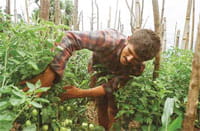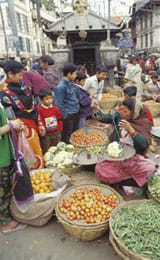Food security exists when people have enough basic food at all times to provide them with energy and nutrients for fully productive lives. When poor people are asked what their highest priority is for themselves and their family, very often their answer is food. The first Millennium Development Goal (MDG) is ‘to eradicate extreme poverty and hunger’. This goal is essential for achieving the other seven MDGs.
Progress has been made in improving food security at the global level. However, the situation is still severe in some countries, especially in sub-Saharan Africa and South Asia. While poverty is the main cause of food insecurity across the world, there are particular issues that make poor people even more vulnerable. These include:
- climate change
- HIV
- conflict
- poor political and economic governance.
Four pillars of food security
The concept of food security can be divided into four main areas:
- availability of food
- access to food
- quality and nutritional value of food
- stability in provision of food.
Governments and development organisations that want to improve food security must consider activities in all of these areas.
AVAILABILITY OF FOOD
It is essential that people have enough food available for their survival. Often there is not enough land available to provide food for local people. This is partly because land is being used to benefit people in countries of the North, such as being used to grow food, animal feed or biofuels. Where there is not enough food available, food needs to be imported. In very difficult situations people rely on food aid.
ACCESS TO FOOD
Sometimes people do not have access to food even when it is available at national level. This is a particular issue for poor households without access to land. There are two important aspects of access to food:
- Economic access People need to have money to buy food and agricultural inputs. Food prices also affect people’s ability to buy food. Food prices are influenced by local and global factors, including the impact of droughts on harvest, government polices and trade agreements.
- Physical access People may live far from the market or insecurity may prevent them from travelling. They may not have access to transport or there may be physical barriers such as poor quality roads, a broken bridge or a road that is washed away.
QUALITY AND NUTRITIONAL VALUE OF FOOD
Food needs to be safe to eat and of good nutritional quality. Good nutrition is important for growth and health. If someone has access to enough good food, clean water, sanitation and health care, their body’s basic needs will be met.
Good nutrition is especially important for children, yet hunger and malnutrition kill millions of them every year. In such situations child feeding programmes and targeted food distributions are an important part of any response.
STABILITY IN PROVISION OF FOOD
Households and individuals must have access to food at all times, either fresh or stored food. However, sometimes there are situations that can affect this. These can be:
- external shocks such as droughts, floods, conflict or poor political and economic governance
- internal shocks such as loss of income or illness.
Key issues to consider
There are some important issues that affect the achievement of the four pillars.
GOOD POLITICAL AND ECONOMIC GOVERNANCE
Many organisations now include an individual’s right to food as part of their advocacy for good governance. This might include:
- ensuring good planning and programming for food security
- helping the poorest people after shocks, such as price increases or poor harvest
- ensuring that food is not being used as a weapon of war or oppression
- tackling corruption so that scarce resources are directed to the production of essential food items rather than luxury items for the wealthy
- ensuring that trade rules and agreements are fair so that small-scale farmers are supported.
HIV
There is a close relationship between HIV and food security. People living with HIV should eat food of high nutritional value in order to stay healthy. Good nutrition is also vital for people taking antiretroviral medication. Even if food is available within a household affected by HIV, there can be malnutrition. This is because illnesses related to HIV can reduce appetite and the body’s ability to absorb nutrients.
As HIV tends to affect productive adults it has a huge impact on food security. This can be due to:
- an individual’s lack of strength to work or farm
- the death of productive family members, along with their farming knowledge and skills
- reduced assets that can be used to buy food, due to spending on healthcare or funerals.
People living with HIV should be encouraged to plant crops that are less physically demanding, such as fruit trees, in preparation for when their illness becomes worse.
SLOW GROWTH IN AGRICULTURE
In many areas of the world there is slow growth, or even steps backwards, in agriculture. In many countries although most people are farmers, they are unable to produce enough food to feed the whole population. This means that some countries have to import food or rely on food aid.
In many countries, hunger and malnutrition are greater in rural areas than in urban areas, even though most people live in rural areas and make their living from agriculture. Numerous studies in sub- Saharan Africa have found that growth in the agricultural sector has a much greater impact on reducing poverty and hunger than urban and industrial growth. Increasing and diversifying agricultural productivity is therefore very important in addressing the food insecurity challenge. One area which needs to be improved is irrigation. Nearly half of the world’s food is grown using irrigation techniques, but these techniques are currently very inefficient.
As part of improving agricultural productivity, environmental issues need to be addressed. Although people in rural areas have conserved much of the rural environment over many years, increasing hunger and population pressures have driven them to carry out some agricultural practices that are damaging the environment. Climate change is increasing the likelihood of crop failures and food insecurity.
GENDER EQUALITY AND EMPOWERMENT OF WOMEN
Women are often primarily responsible for household food security. In many countries women contribute most of the labour in food production. Women are also responsible for the majority of the food processing and preparation. They ensure that children and all other members of their households are fed and nourished.
Yet women rarely receive as much agricultural support as men, such as loans and agricultural extension services. This means that they do not produce as much food as they could for their families.
Governments and organisations must consider gender issues related to food security if progress is to be made.
Dr Ruvimbo Mabeza-Chimedza is an independent consultant. She specialises in food security and livelihoods.
Email: [email protected]








